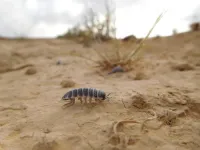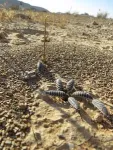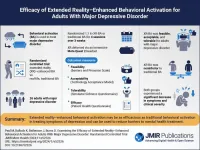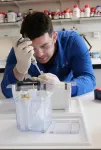(Press-News.org) New research on desert isopods' dietary preferences is the revelation of the complex factors influencing their food choices. By understanding how these animals meticulously regulate their nutrient intake and prefer biological soil crusts over plant litter, the study highlights the intricate dynamics of trophic interactions. Understanding the dietary preferences of desert isopods sheds light on the intricate interplay between organisms and their environment, informing ecosystem management and conservation strategies.
New study sheds light on the intricate nutritional and functional dynamics shaping the dietary choices of desert isopods (Hemilepistus reaumuri). The study, published in Ecology Letters unveils the multifaceted considerations that influence food selection among these fascinating creatures. The research was conducted under the guidance of Prof. Dror Hawlena from the Hebrew University by (then PhD. student) Dr. Moshe Zaguri at the Institute of Life Sciences at the Hebrew University and now from the Volcani Institute in collaboration with Prof. David Raubenheimer from the University of Sidney.
Foods are complex mixtures of chemical compounds provided in various levels of digestibility that humans and animals ingest for nutritional support. Often, animals need to ingest several food types in order to fulfill their multidimensional nutritional needs and may suffer health consequences by not eating the needed nutrients in specific quantities and ratio. Understanding what considerations influence dietary choices is, thus, a very important but extremely challenging question to study. The authors’ addressed this challenge by focusing on the simple but mysterious diet of the desert isopods- an interesting species of pill-bug that eats dry leaves and large quantity of nutritionally poor biological soil crust (the upper lair of desert soils that harbor many microorganisms).
The researcher fed isopods with natural and artificial foods and found that when allowing a choice, isopods can tightly regulate their food consumption to meet a very specific ratio of proteins, sugars and calcium. Isopods received most of their proteins and sugars from dry leaves and eat soil crust to meet their very high calcium needs. The exoskeleton of isopods is made of calcium carbonates that they must consume in large quantities to grow. However, when isopods could supplement leaf litter with artificial sources of calcium, they successfully met their exact calcium needs, but suffered reduced growth. The authors used gamma-radiation to kill the microorganisms of the soil crust while maintaining its nutritional value and measured the isopods’ food assimilation efficiency and growth rate in comparison to isopods that ate untreated crust. The authors found that isopods eat the crust to incorporate live microorganisms to their digestive system. Those microbes assisted to improve digestion of the fibrous plant litter. The authors concluded that isopods eat foods that allow them to meet their nutritional needs by providing the nutrients but also by helping them to digest. These revolutionary findings may shed new light on how different animals and humans choose their diet by considering both the foods nutrients and the existence of digestive assisting agents. Humans do not eat soil crust but may think about the general insights of this interesting study during their next visit to the local grocery shop.
Animals optimize their fitness by assimilating specific quantities and ratios of macronutrients and mineral nutrients. To understand this phenomenon, the team conducted extensive field and laboratory experiments focusing on the dietary preferences of desert isopods. Contrary to expectations, wild isopods exhibited a preference for macronutrient-poor biological soil crust (BSC) over plant litter, consuming three times more of the former.
The research revealed that desert isopods rigorously regulate their intake of macronutrients and calcium, with phosphorus intake remaining unaffected. Moreover, the team observed that despite equivalent calcium ingestion, isopods thrived better when consuming BSC compared to artificial foods. Notably, isopods consuming gamma-radiation-sterilized BSC exhibited increased consumption but slower growth rates compared to those consuming live BSC, suggesting the crucial role of ingested microorganisms in facilitating litter digestion.
Dr. Moshe Zaguri, lead researcher of the study, commented, "Our findings underscore the complexity of dietary decision-making among desert isopods and highlight the importance of considering multifaceted factors in understanding trophic interactions."
Understanding the complex nutritional and functional considerations driving the dietary choices of desert isopods is crucial for advancing our knowledge of ecological dynamics. This research sheds light on how these animals optimize their fitness by regulating nutrient intake and preferring specific food sources. By uncovering the role of ingested microorganisms in facilitating digestion and growth, the study emphasizes the interconnectedness of organisms and their environment. Moreover, it highlights the broader implications for ecosystem management and conservation efforts, underscoring the need for interdisciplinary approaches in ecological research to address the multifaceted factors influencing trophic interactions and ecosystem functioning.
END
Unraveling isopods' culinary secrets and why it matters for ecosystems
2024-05-06
ELSE PRESS RELEASES FROM THIS DATE:
Beyond therapy: Virtual reality shows promise in fighting depression
2024-05-06
(Toronto, May 6, 2024) A new study published in JMIR Mental Health sheds light on the promising role of virtual reality (VR) in treating major depressive disorder (MDD). Titled "Examining the Efficacy of Extended Reality–Enhanced Behavioral Activation for Adults With Major Depressive Disorder: Randomized Controlled Trial," the research, led by Dr Margot Paul and team from Stanford University, unveiled the effectiveness of extended reality (XR)–enhanced behavioral activation (XR-BA) in easing symptoms of depression.
MDD affects millions worldwide, and access to evidence-based psychotherapies remains a challenge for many. Traditional treatments ...
How likely are English learners to graduate from high school? New study shows it depends on race, gender, and income
2024-05-06
English learners are, on average, less likely to graduate high school in four years than students who never needed to learn English in school. But social identities like race and gender make a difference, and some groups of English learners are actually more likely to graduate, according to a new study by a team of education researchers at NYU and the University of Houston.
For instance, young women who ever learned English in school are more likely to graduate in four years than young men who did not. Similarly, Black English learners tend to have better four-year graduation rates than Black peers who never needed to learn English ...
SwRI’s Herron named 2024 ASSP Safety Professional of the Year
2024-05-06
SAN ANTONIO — May 6, 2024 —The American Society of Safety Professionals (ASSP) has named Southwest Research Institute’s Matthew Herron, M.S., P.E., CSP, CPE, its 2024 Safety Professional of the Year. The award is presented annually to an ASSP member who demonstrates outstanding achievement in the occupational safety and health (OSH) field while also advancing the OSH profession overall.
“It’s a great honor to be recognized by the ASSP as Safety Professional of the Year,” said Herron, a lead safety engineer in SwRI’s Mechanical Engineering Division. “I firmly ...
Long-term cardiovascular outcomes in children and adolescents with hypertension
2024-05-06
About The Study: Children diagnosed with hypertension had a higher associated long-term risk of major adverse cardiac events compared with controls without hypertension. Improved detection, follow-up, and control of pediatric hypertension may reduce the risk of adult cardiovascular disease.
Authors: Rahul Chanchlani, M.B.B.S., M.D., M.Sc., of McMaster University in Hamilton, Canada, is the corresponding author.
To access the embargoed study: Visit our For The Media website at this link https://media.jamanetwork.com/
(doi:10.1001/jamapediatrics.2024.1543)
Editor’s ...
CRIPSR gene editing leads to improvements in vision for people with inherited blindness, clinical trial shows
2024-05-06
KEY TAKEAWAYS
BRILLIANCE trial results showed 11 out of 14 treated participants experienced some improvements in vision and quality of life measures.
CRISPR-based therapy was found safe with no dose-limiting toxicities reported.
Mass Eye and Ear researchers say their findings support continued research and clinical trials of CRISPR therapies for inherited retinal disorders.
BOSTON- (MAY 6, 2024) Results from a groundbreaking clinical trial of CRISPR gene editing in 14 individuals ...
Improvement seen in most participants of pioneering CRISPR gene editing trial
2024-05-06
PORTLAND, Oregon – About 79% of clinical trial participants experienced measurable improvement after receiving experimental, CRISPR-based gene editing that is designed to fix a rare form of blindness, according to a paper published in the New England Journal of Medicine.
“This trial shows CRISPR gene editing has exciting potential to treat inherited retinal degeneration,” said Mark Pennesi, M.D., Ph.D., a corresponding author on the paper, an ophthalmologist and Oregon Health & Science University’s lead scientist for the Phase ...
Cybersecurity education varies widely in US
2024-05-06
PULLMAN, Wash. -- Cybersecurity programs vary dramatically across the country, a review has found. The authors argue that program leaders should work with professional societies to make sure graduates are well trained to meet industry needs in a fast-changing field.
In the review, published in the Proceedings of the Association for Computing Machinery’s Technical Symposium on Computer Science Education, a Washington State University-led research team found a shortage of research in evaluating the instructional approaches being used to teach cybersecurity. The authors also contend that programs ...
New vaccine effective against coronaviruses that haven’t even emerged yet
2024-05-06
Researchers have developed a new vaccine technology that has been shown in mice to provide protection against a broad range of coronaviruses with potential for future disease outbreaks - including ones we don’t even know about.
This is a new approach to vaccine development called ‘proactive vaccinology’, where scientists build a vaccine before the disease-causing pathogen even emerges.
The new vaccine works by training the body’s immune system to recognise specific regions of eight different coronaviruses, including SARS-CoV-1, SARS-CoV-2, and several that are ...
Simulated chemistry: New AI platform designs tomorrow’s cancer drugs
2024-05-06
Scientists at UC San Diego have developed a machine learning algorithm to simulate the time-consuming chemistry involved in the earliest phases of drug discovery, which could significantly streamline the process and open doors for never-before-seen treatments. Identifying candidate drugs for further optimization typically involves thousands of individual experiments, but the new artificial intelligence (AI) platform could potentially give the same results in a fraction of the time. The researchers used the new tool, described in Nature Communications, to synthesize 32 new drug candidates for cancer.
The technology is part of a new but growing trend ...
Human ‘neural compass’ pinpointed in new study
2024-05-06
A pattern of brain activity that helps prevent us from getting lost has been identified in a new study, published in Nature Human Behaviour.
Researchers at the University of Birmingham and Ludwig Maximilian University of Munich have for the first time been able to pinpoint the location of an internal neural compass which the human brain uses to orientate itself in space and navigate through the environment.
The research identifies finely tuned head direction signals within the brain. The results are comparable to neural codes identified in ...







